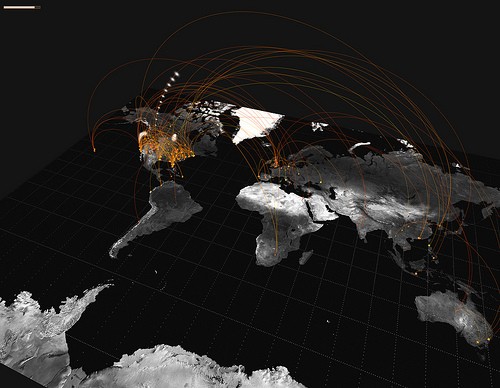Latest TPP leak suggests a wave of dissent amongst negotiating parties
Citizens around the world clearly don’t like what the Trans-Pacific Partnership (TPP)—a worrying multinational trade agreement—would do to the Internet and the rules that surround its governance. This distrust and concern has been vocalized clearly by over 100,000 pro-Internet community members who have signed the StopTheTrap.net petition. Beyond the TPP’s clear potential to lock us into an Internet trap, which would criminalize a lot of what we do online, there’s also the secrecy aspect: the TPP negotiation process has been anything but transparent and accountable. Public participation? Recognition of civil society stakeholders? Industry lobbyists don’t want any of it.
This is why the TPP negotiations continue to take place behind closed doors, shrouded in secrecy. But there have been leaks, the most recent of which appeared just recently. Though it’s only a few short paragraphs, the text reveals that U.S. lobbyists, while trying to appear to back down, are leaving themselves plenty of room to block content, fine users, and terminate connections.
Ars Technica reporter Megan Geuss summarizes this piece of TPP history well:
The TPP met last in early July in San Diego, CA for a round of negotiations, but none of the draft texts were made public. After that round of negotiations concluded, the USTR sent an e-mail to the press announcing that it was proposing language on fair use and limitations to copyright in the international treaty, a first for the generally conservative agency. But the leaked text, revealed by Knowledge Ecology International, suggests that these exceptions to IP rules won't be quite as open as some fair use advocates had hoped.
This comes as reports of a lobbying tour of TPP member countries indicate that the U.S. is going above and beyond to quell opposition to the agreement’s restrictive measures.
As the most recent leak suggests, the U.S. and Australia are pushing for more restrictive language, while other negotiating countries like New Zealand, Chile, Malaysia, Brunei, and Vietnam are in favor of more open rules. Let the arm-twisting begin.
U.S. trade officials made stops in Malaysia and Vietnam last week to discuss objections to the TPP’s intellectual property provisions. This after the latter two countries (among others) pushed to revise the text to allow national laws—those that are, in democracies, created more transparently and with public opinion in mind—to be a part of how the rules around fair use are decided.
It wouldn’t be surprising that the U.S. would want to build national governments’ support of invasive copyright restrictions. We now know that when the Canadian government was considering a copyright Amendment Act (the recently-passed Bill C-11), U.S. lobby groups exerted a huge amount of pressure on key MPs, which helped create a threat of an Internet lockdown. Malaysia is in a similar position; last April Malaysia enacted a law that largely reflects U.S. copyright law and the U.S. TPP proposals.
A quote from New Zealand ICT Minister Amy Adams exemplifies concerns that the citizens of many of the TPP nations are facing: “They are often seen in this negotiation space as being firmly on the side of rights holders’ [Big Media’s] agenda, but actually domestically they are still having this debate right now on the idea of the free Internet.”
In Australia, Greens Senator Scott Ludlam, echoed Adams’ take: "The Trans-Pacific Partnership Agreement, if the USA gets its way, will cause huge problems for Australians, but our Federal Government is backing Washington to the hilt.”
The next round of TPP negotiations is set for early September in Leesburg, Virginia. There, the discussion could focus on initial reactions to the recently-leaked proposal, which was tabled near the end of the last round in July.




 Take action now!
Take action now!
 Sign up to be in the loop
Sign up to be in the loop
 Donate to support our work
Donate to support our work